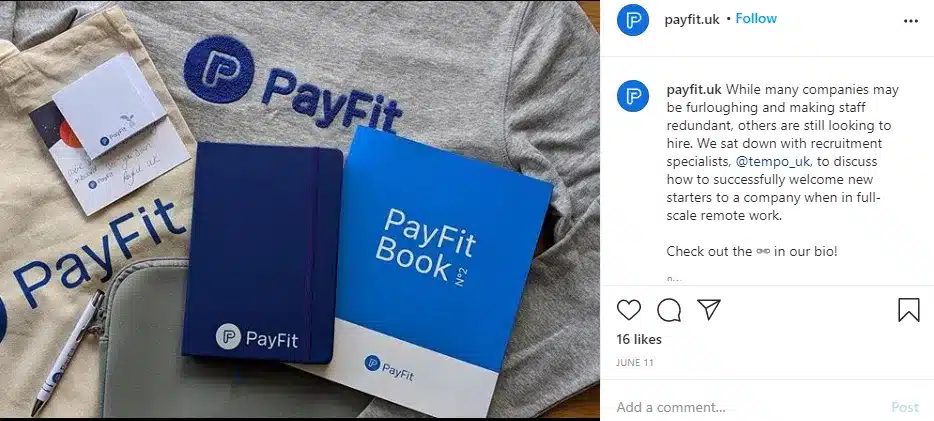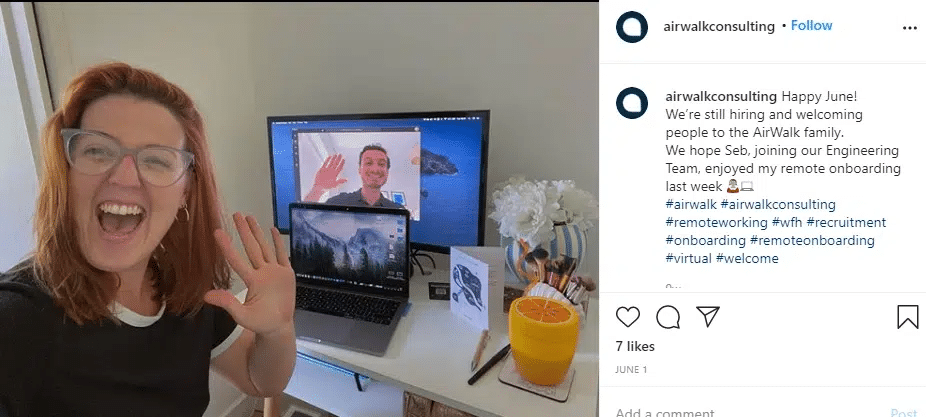
Whether it’s your first job or twentieth, you will always have fond memories of your day 1 at a new workplace.
It always feels like a new chapter is about to begin – you meet new people, get yourself acquainted with the new work culture and get ready to start afresh.
However, all of these activities seem to have taken a backseat as the entire process of hiring and onboarding has now become virtual.
With remote onboarding, the need for human connection and a welcoming experience becomes even more pressing.
As an HR, you’re now responsible for making the onboarding experience of new remote employees as hassle-free and memorable as possible.
In this article, we set out to explore small details that can make remote onboarding successful and how you can provide a hands-on, personalized experience to new hires.
Start the onboarding process of remote employees way before day 1
By the time your new hire logs in on their first day, their paperwork and formalities must be completed.
Aim to make their first day about interaction and minimize the need for calling you or the IT department for getting the things to run.
All you need to do is start the pre-boarding process at least a week before day 1.
Here’s a quick checklist of what you can do to kick off your onboarding process well in advance –
- Send an email requesting new hires to submit all their necessary documents.
- Introduce them to their reporting managers and encourage them to communicate with them.
- Also, share the details of their work-buddy (we’ll discuss this in detail, later) and help them to reach out to them
- Get their work email and log-in IDs running.
Pro tip: Use a software like Peoplebox, that can help you in starting your onboarding process.
The software can help you map the entire onboarding process with milestones, check-in alerts and task reminders.
This software also has a variety of templates for the pre-boarding mails which can be customized with your brand theme and message to make the communication more personalized.
Share all the important documents online
Upload your employee handbook and decks related to company culture online.
You can even go a step further and create videos to welcome remote employees, introduce them to the work norms and help them understand the process better.
At Dell, the onboarding team has created a digital repository of everything required to make the process easy – documents, videos and instructions.
Send the new joiners an agenda for the onboarding week
An agenda lays an outline for the expected events and their timeline.
It will help your new remote employees in preparing themselves before they join in and will also lessen your responsibility of checking-in on them throughout the day.
Let them know about their meetings, who will they be communicating with and what will be the purpose of a particular call.
With an agenda, your new remote employees will know what to expect and you will also have a checklist to prepare for the first day.
Make the welcome kit remote-friendly
Usually, every organization provides a “welcome kit’ to their new hires.
It contains the company’s stationery, t-shirts and other goodies to make new employees feel like a part of the organisation.
During the onboarding of remote employees, you can get innovative and include items that could also be useful in a work-from-home setup.
From a comforter cushion, energy-boosting cookies, to a set of good-quality headphones, mouse or even a wifi booster – anything that can make your remote employees’ lives easier.

Help your remote employee set their workspace
In an on-site onboarding, fixing the work setup is hassle-free as your IT team can easily take care of it.
With remote employees, this process will involve delivering the laptops and other equipment to different locations.
That is why you will have to start the coordination process way earlier than usual so that everyone has the necessary equipment before the onboarding starts.
Provide them with a checklist mentioning all the supporting equipment (secondary screen, cables and the likes) to perform the tasks related to their job at their home so that they can inform you beforehand.
Similarly, if your organisation requires your employees to download any particular application, security patch or software upgrade, let them know and help them in the process.
Introduce them to the team
Being a part of an organisation means getting a new set of friends, being a part of many inside office jokes and enjoying company events together.
Due to the circumstances, these moments are most likely to be missed by the new employees.
Thus, you will need to create opportunities for your new hires to gel with their team.
Virtual Games for Remote Teams
CoffeeConnect connects two people every week based on their interests in slack and helps them build camaraderie easily with ice-breakers questions, rapid-fire quizzes and virtual coffee.
Try One-on-Ones tool for Free
Build and track your one-on-one culture and make sure that every one-on-one is actionable and meaningful.
You can begin by scheduling an introductory call and letting every team member welcome the new hire.
You must also induct them into the informal communication channels of their department and help them build connections.
Pro tip: Begin your introductory team call with fun icebreaker questions and fun games to keep the mood light and friendly.
Find icebreaker games to build great connect with your remote teams HERE!
Assign a work buddy
Carrying forward from the last point, a work buddy can be of great help in making new hires feel comfortable and learn the ropes of the job.
The buddy culture has helped many companies establish a strong mentoring culture and has resulted in better intra-departmental coordination.
What a remote onboarding lacks is human connect and a buddy can provide just that!
Pairing your new remote employees with a buddy will delegate your responsibility of taking care of the new remote employees and they will get hands-on information about the internal working.
In fact, a buddy might even introduce them to more people on a personal level.
Getting insider information and recommendations from a teammate is much more intimate and comforting.
Encourage cross-functional communication
Remote work has led to the creation of many mental silos amongst team members; especially when it comes to a new employee.
Since they have never worked with the team in person, they only tend to speak to the people they were introduced to by the HR and their leads.
There’s no scope of bumping into a person from another team in the office cafeteria or the bay and communicating with them.
Thus, it is important to ensure to introduce them to at least one person from each team they may have to coordinate with during the onboarding process.
This step will open doors for future communication and will help them in carrying out their responsibilities effortlessly.
Have a concrete training plan ready
The first weeks of every new job are always relaxed and chilled out.
They tend to become even more so during a WFH setup as the remote employees are with their families and in the comfort of their homes.
A training plan helps to keep them alert and ensure that the remote employees give their best in understanding the job responsibility and company culture during the onboarding process.
With a comprehensive training plan, your employees will feel valued and better equipped to carry out their responsibilities.
Don’t forget your one on one meetings
One on one meetings are very important during the onboarding process of remote employees.
You need to frequently check-in and ask them if the process is going smoothly.

You must also set up goals and expectations during your one on ones and check on their progress.
For example – At the end of the first week, what should be accomplished? What should be the learning outcome of the training program?
You must also take this opportunity to take their feedback and try to work out things they are facing difficulties with.
Virtual Games for Remote Teams
CoffeeConnect connects two people every week based on their interests in slack and helps them build camaraderie easily with ice-breakers questions, rapid-fire quizzes and virtual coffee.
Try One-on-Ones tool for Free
Build and track your one-on-one culture and make sure that every one-on-one is actionable and meaningful.
During remote work, it is always better to over-communicate when onboarding the new employees.
Closing thoughts
Onboarding remote employees may seem like a tough nut to crack but the right mindset and detailed preparation can help you go through this process smoothly.
All you need to do is make communication, planning and video call your best friend – rest will be taken care of.







